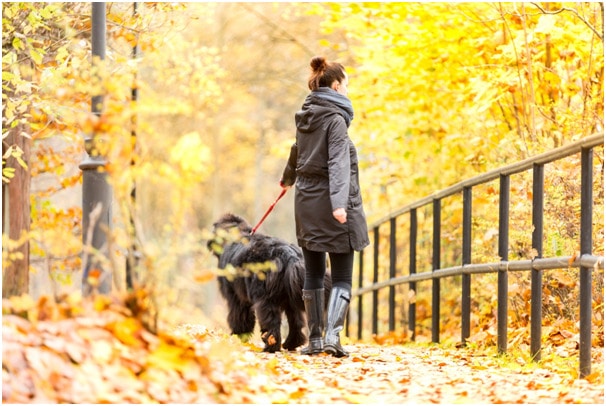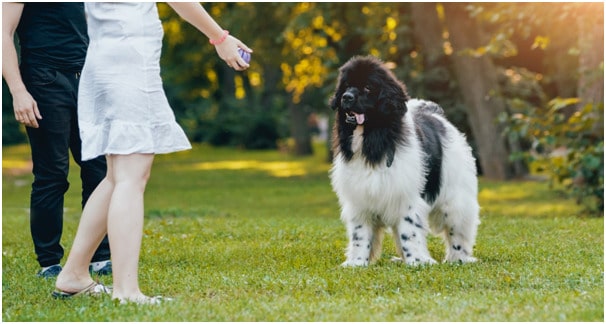While the Newfoundland dog is not known to be the best guard dog, many people wonder if this breed will protect its owner.
A Newfoundland will protect its owner when they feel there is danger. They are generally a friendly breed to both humans and other dogs and sometimes aloof, but they will jump right in to defend their family when it comes to real danger.
In this post, we explore how protective a Newfoundland is in different environments, along with methods to increase their level of protectiveness.
Will my Newfoundland protect me?

Very likely, they will, but not always how you’d expect. They’re not traditionally aggressive dogs, so they are unlikely to try to frighten or intimidate a dangerous person or another animal away.
However, they are known to have a kind of ‘sixth sense’ for danger and will try to steer their owner away from dangerous situations. They are also great with children in this sense.
Due to their loyal nature, they will use their bodies as a shield to protect their owners when danger presents itself.
They can get aggressive when someone or something else instigates things but generally rely on de-escalating a situation.
A Newfoundland is a large intimidating breed.
Perhaps your most effective defense with a Newfie on the porch is that they are a large and intimidating breed. They have a deep and intimidating bark and do tend to like using it when a person approaches. However, they rarely escalate to outright aggression.
If you see them chase down a squirrel or other small animal, you can see that they can use their heft when they want to. Generally, however, the local mailperson isn’t going to get much other than slobber all over them when they come to the door.
Newfoundlands have been trained as working dogs.
Newfoundlands are among the 30 dog breeds known as working dogs. In particular, they specialize in water work, but working dogs do share many different dispositions.
They are strong, intelligent, and courageous, with many loyal, strong people-pleasing instincts and even temperaments.
A working dog’s strongest trait is its general workhorse strength coupled with the ability to be trained.
They are trained in many different fields, but they are especially great at water rescue and general search and rescue work.
With their water-resistant double-coat, they don’t mind getting into water and power stroking their way to the rescue. A Newfoundland will often try to ‘herd’ their family back to shore when they are in the water in an attempt to help them.
In both water and ground rescue, they have an innate sense of danger when someone needs help. So you’ll see them rushing off to help them when they sense something is wrong.
Their sniffing ability is solid enough to help with ground search and rescue as well. In addition, they behave well in stressful situations and are easy to train.
Newfoundlands have been used to protect fishermen from sharks and other large sea creatures.
As water working dogs, Newfies use their powerful swimming and rescue abilities in the water to protect their owners.
They’ve been known to protect their owners from sharks and other sea creatures in different situations and will protect them just as fiercely in the water as on land.
Generally, they will first try to rescue you from a dangerous situation, and if they can’t do that, they will place themselves in harm’s way to save you.
Will your Newfoundland protect your home?
Newfoundlands are not territorial dogs, so they are unlikely to feel protective of their house and home. However, when it comes to people, they can be much more possessive.
However, they have their large stature and a deep bark to intimidate most people. Many would-be intruders probably won’t know they don’t have a territorial instinct and will be intimidated just by their size.
Will your Newfoundland protect livestock?
Newfies are not herding animals in that sense, although some of them might do it sometimes. They would rather stay inside and wait for their owners to come home than take care of the livestock for the most part.
Funnily enough, Newfoundlands do tend to have a bit of a herding instinct with their family, though, as they like to keep everyone without their eyesight to watch over them. Especially if they feel the family is in danger, they might circle the group or keep checking on everyone.
Will your Newfoundland protect your family?

Newfoundlands have a pretty keen sense to protect children from regular danger. They like to herd and protect the family a bit and don’t enjoy it when they can’t watch the whole family at once.
For the most part, they use being watchful and intimidating to protect the family rather than being aggressive. However, they will bark and use their large size to intimidate others, often coming between you and whatever poses a threat.
They have been known as “nanny dogs” due to these traits.
Are Newfoundlands territorial to other dogs that enter the yard or home?
Not so much. Newfies tend to be either friendly or aloof towards other dogs. But, of course, every dog is different, and due to their size, you should be wary about introducing your Newfoundland to other dogs without knowing their temperament.
But, generally speaking, they are not a very territorial breed when it comes to the yard or home. This even includes when they are around other dogs.
Breeding, socialization, and training your Newfoundland are essential.
As with all dogs, your Newfoundland’s specific breeding, socialization, and training will play a huge role in determining its traits as a guard dog.
Breeding tends to be the most significant factor in terms of innate protective instinct. On average, Newfies have a low territorial instinct but high protective instinct towards their owners and family.
Socialization refers to having your Newfie meet other humans and dogs when they are young. The more they get used to others, the better they will be when they grow up and understand how to handle situations with others.
Finally, there’s no substitute for training. Although Newfoundlands don’t have too many common behavioral problems, controlling them can be essential. This is especially true considering how big they are.
How do you train your Newfoundland to be protective?
Newfoundlands have a natural watchdog sense of protection for their owners, but not as much for the house.
They are good at barking for both intimidation and to alert the owners that something is happening.
‘When it comes to training, they are best as watchdogs rather than guard dogs. A good watchdog will alert you to danger. They will also discourage intruders through their barks as well.‘
Guard dogs tend to be a step further and will get aggressive quickly, working to stop intruders in their tracks. Unfortunately, Newfoundlands are very hard to train in this direction. For the most part, you need particular breeding to have a dog like that.
Why use a Newfoundland breeder?
Breeders can tell you which temperament of Newfie is most suitable for your household situation and needs. However, when you get a Newfie elsewhere, you may not have as much information about their genetic tendencies.
They will also sell a Newfoundland that is closer to standard than most other places. However, you can’t be as sure what to expect behaviorally from their genetic makeup with rescues or other dogs.
Final thoughts
The Newfoundland is a wonderful family pet that will protect its owner when the time comes. Just don’t expect them to be outright aggressive very often.
Instead, they tend to be goofier and aloof gentle giants who just want to see their families happy.
When it comes right down to it, they will rescue you from danger. They will put their body in harm’s way, and may even attack intruders if they feel the threat to you is severe enough.


